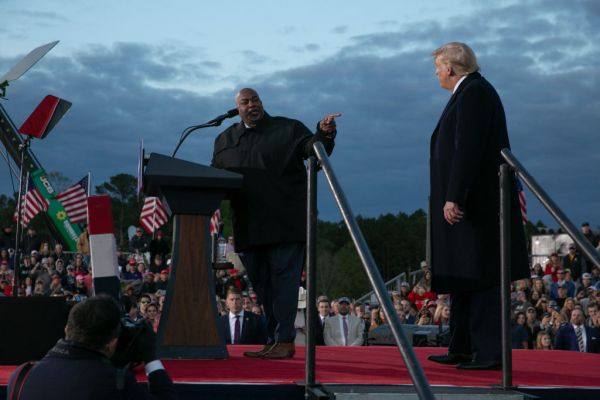Centrist third parties don’t work.
They could work, hypothetically. When both major parties are led by unfit, unpopular candidates, America’s disgusted centrists might logically rise up, cast off their partisan chains, and unite behind some moderate alternative.
So why didn’t they do that earlier this year when we had two unfit, unpopular candidates running away with their parties’ nominations?
There are two reasons, and those reasons will always recur with centrist third parties. One is that the center-left and center-right often don’t agree on policy, which makes it hard to reach consensus on an agenda. Everyone loves the idea of a centrist party; it’s when the time comes to start filling in the blanks on how to govern that the quarrels begin.
The other problem is that the more unpopular the major-party candidates are, the more strategic centrist voters are likely to be. Many who feared that Joe Biden would become dangerously senescent or that Donald Trump would become dangerously unhinged in a second term were destined to conclude that the stakes were too high to waste their vote on a third party. As a matter of basic civic responsibility, they’d need to choose the lesser of two evils.
All you need to know about the folly of centrist third parties is that the group No Labels raised millions of dollars, earned the support of well-known figures like Sen. Joe Manchin and former Maryland Gov. Larry Hogan, and in the end couldn’t even recruit a presidential candidate because of anxiety that its nominee would spoil Biden’s chances and tip the election to Trump.
Centrist third parties don’t work. But third parties with a distinct vision—ideologically, civically, and/or morally—are more intriguing. Give voters something to vote for, not just against, and maybe that’s the start of something big.
America’s most respected Never Trumper is thinking big.
Anti-Trump Reaganites have chattered about a new party for years, but the time for one has never been ripe. In 2016, Trump caught us by surprise; in 2020, incumbency guaranteed that Republican voters would stick with him; in 2024, criminal indictments plus semi-serious challenges from Ron DeSantis and Nikki Haley raised hope that sanity might yet prevail in a GOP presidential primary.
Sanity did not prevail.
As one traditional Republican after another announces this year that they won’t endorse Trump or that they’ll even vote for his opponent, there’s a sense that for many Reaganites this cycle was the last straw. They gave their party three chances to do the right thing. It refused. It’s time for something new.
Is it, though?
Godspeed to Liz Cheney and any other patriot willing to join the effort, but I’m skeptical that a Reagan Party would matter on Election Day 2028 except at the margins. Whether Trump wins or loses this race, it’ll be tragically easy for the average conservative voter to rationalize sticking with the GOP indefinitely.
The best-case scenario for Reaganites, I’m afraid, is a Green Party of our very own.
The upside of a new party.
I don’t think a third party needs to be electorally successful to be politically successful.
The great virtue of a Reagan Party would lie in offering an alternate model of right-wing politics for young Americans who lean conservative. A generation of Republicans has come of age believing that to be of the right is necessarily to be an enthusiast of demagogic nationalism. Classical liberals cannot concede that point.
The mere fact of the Reagan Party’s existence would serve the public good by demonstrating that, for conservatives, there can be no peace with authoritarians. It would elevate fidelity to the constitutional order to its proper place as a civic imperative that trumps policy differences. Too many Americans have been convinced, or have convinced themselves, that a failed coup plot is just one more issue in this election to be weighed against inflation or immigration.
Nothing short of a formal divorce will suffice at this point to communicate how strongly classical liberals object to the mainstreaming of postliberalism. The difference is irreconcilable.
And so I think the Reagan Party would do greater good as a civic entity than as a political entity. There would be policy tensions with the GOP on trade, interventionism, federal spending, and possibly abortion, of course, but disagreements on policy rarely warrant the creation of a new organization. Reaganites don’t need to quit the Republican Party to advocate for their pet issues. They need to quit it to punish it for its romance with authoritarianism.
A new party would also prove useful by challenging the GOP’s tribal claim to right-wing voters.
So much of American politics derives from partisan tribal identity. As welcome as it is to have the likes of Liz and Dick Cheney endorse Kamala Harris this year, they’re swimming upstream psychologically in trying to convince card-carrying Republicans to cross the aisle and vote Democratic. Creating a party that caters specifically to Reaganites would allow those conservative Republicans to formally sever the bond they have with the GOP. And once that tribal bond is severed, I suspect, those voters will no longer reflexively search for reasons to prefer Trumpist Republicans to Democrats at the polls.
Reaganite voters need to know that they’re not forfeiting their right-wing identity by opposing MAGA populists. Membership in an alternative conservative party would give them the reassurance they crave.
There are other, more practical reasons to want a Reagan Party in place in 2028. For one, an organized bloc of conservatives might exert the same sort of pressure on the GOP with respect to its pet issues that the Green Party does on Democrats. Just as Harris needs to take care not to tiptoe too far toward supporting Israel before progressives begin peeling off for Jill Stein, a Republican nominee of the future might worry that too much moderation on abortion or isolationism abroad will spoil their right-wing coalition. That’s less of a concern at the moment, when the GOP is still the only game in town.
Beyond that, the 2028 picture is so murky that the Reagan Party’s presidential nominee could make a splash depending upon how dismal the Republican nominee is. On Sunday, Trump said he’s unlikely to run for president again if he loses this election. Given how he’s slowed down on the trail this year, I tend to believe him. If GOP primary voters end up nominating a candidate who’s unpopular or loony-tuney—and they’re capable of either, or both—a Reaganite third-party alternative might get traction with disaffected Republican voters as the campaign wears on.
It’s even conceivable that, deprived of Trump’s leadership, his movement will collapse and ignite real competition between the GOP and the Reagan Party to lure free-agent right-wing voters into their respective camps.
Remember, Nikki Haley was still pulling 20 percent or so against Trump in this year’s Republican primary after she dropped out. If you’re a diehard Never Trumper like Liz Cheney, you might look at that and understandably see the nucleus of a formidable third party in the making.
You might, but I don’t. And I’m a pretty diehard Never Trumper myself.
If Trump loses …
The basic problem is this: No matter whether Trump wins or loses this race, the average conservative will have ready excuses available to stay put in the GOP instead of decamping for the Reagan Party.
Start with the defeat scenario. In theory, seeing Trump lose another election and a third straight national popular vote should be enough to discredit populism as an electoral force among Reaganite voters. It’s one thing to hold your nose and support a MAGA-fied GOP if it’s winning contests that Republicans traditionally have lost. But if it’s losing winnable elections and its agenda stinks, why not bail?
That’s not how most conservatives will view another Trump defeat, though (assuming they accept that he was legitimately defeated at all). I think they’ll see it as an opportunity: Now that he’s lost another race and—knock on wood—is retiring from politics, Reaganites have a real chance for a renaissance in 2028.
They’ll tell us that every Republican who quits and joins the Reagan Party is depriving Brian Kemp of a vote that might make the difference against J.D. Vance or some other nationalist toad in the next presidential primary. Why, only a fool would give up on the GOP at the very moment that meaningful change seems possible.
Never underestimate a partisan conservative’s ability to convince himself that the right’s populism problem is merely a Trump problem. Once Trump retires, poof—the problem is solved and any need for a new party is gone with the wind.
There’s another class of traditional conservative, meanwhile, that will hear the case for the Reagan Party in the aftermath of a Trump defeat and say: Whaddaya mean the GOP is no longer a Reaganite party?
Ask most older Republican voters if Trump reminds them of Ronald Reagan and they’ll say yes, I suspect. Why? Because they’re both “tough.” Within my own Trump-loving extended family, the idea that Kamala Harris might be tougher on America’s enemies than Trump would is literally laughable—never mind that Trump, not Harris, is the one who’s sounded ambivalent at times about supporting Ukraine, Taiwan, and NATO.
Many voters don’t follow policy, especially foreign policy, closely enough to discern meaningful differences between the candidates, let alone closely enough to discern evolving ideological currents within a major party. They fall back on “vibes.” Trump, the boorish strongman, easily passes the “Who’s more like Reagan?” vibes test relative to the diminutive woman from San Francisco.
So when Liz Cheney comes to those voters after another Trump defeat and pleads with them to recognize that this is no longer Reagan’s party, they’ll scratch their heads and say, in all sincerity, “How so?” The more policy-literate among them might even point back to Trump’s first term and note, with some justification, how Gipper-esque some of his initiatives were at the time. Didn’t he pass a huge tax cut? Didn’t he try to repeal Obamacare? Wasn’t he tough on Iran? Didn’t he stick with NATO, however grudgingly? That’s all pretty Reaganite!
If Trump loses to Harris, we’ll never get to see how comprehensively his second term might have dispensed with Reaganism with committed authoritarians like J.D. Vance now whispering in his ear. Republican voters who presently live in blissful ignorance about how much their party has changed under their noses will get to crawl on in ignorance for another four years. Switch parties? Whatever for?
And of course, as President Harris occasionally yet inevitably overreaches by pandering to the left, the backlash on the right will make ditching the GOP an even harder sell. The same strategic voting conundrum that foils centrist parties like No Labels will begin to spoil the Reagan Party’s recruitment strategy: Only by uniting behind the Republican nominee, we’ll be told, can the right stop Commie-la from opening gulags in a second term.
If Trump wins …
Ironically, it’s only if Trump wins in November that low-information Reaganite voters might learn a hard lesson about how different the current Republican Party is from the one they remember.
Maybe the Vances and Tucker Carlsons around Trump will persuade him to call American troops home from around the world. Maybe Trump will go hog wild with protectionism and bring the economy to its knees with tariffs and mass deportation. Maybe he’ll ramp up federal spending to the point of triggering America’s long-awaited fiscal crisis. Maybe he’ll thwart an attempt by a Republican Congress to pass federal abortion restrictions.
To believe that this is no longer Ronald Reagan’s party and that a new conservative party is needed, traditional Republicans might need to actually see Trump’s turbo-charged nationalist GOP govern. But there’s a problem: For them to see it, Trump’s GOP will have to have won the 2024 election. And voters like being part of a winning party.
A winning party is a capable party, by definition. And a capable party isn’t going to be second-guessed vehemently on ideological grounds by its rank-and-file, even if that rank-and-file nominally prefers Reaganite policies.
Through victory, all sins are forgiven.
So when President Trump turns the dial up to 11 on tariffs or pulls out of NATO or gives Vladimir Putin a new friendship bracelet he made, traditional conservatives might wince. But most will quickly reassure themselves that he must know what he’s doing. He won, didn’t he? Certainly, things would be even worse if they had thrown their votes away on a third party and Kamala Harris had eked out a win!
If all that didn’t make it hard enough for the Reagan Party to find recruits, Democrats will make it harder in 2028 by competing aggressively (again) for center-right votes if Republicans nominate a populist in the Trumpist mold. Figures like Pennsylvania Gov. Josh Shapiro and Michigan Gov. Gretchen Whitmer will run to the middle, believing they can lure away MAGA-weary Republicans. And that too will create strategic-voting pressure on conservatives who are curious about the new Reaganite party.
Do you want to cast a meaningless symbolic vote for Liz Cheney or do you want to help Shapiro slay the nationalist gargoyle J.D. Vance?
Cheney’s own behavior over the past month presages the problem a third party would have. Not only has she endorsed Kamala Harris for president, she’s endorsed Democrat Colin Allred in his Senate race in Texas over Ted Cruz—even appearing with Allred in interviews. The greater the civic imperative to defeat figures like Trump and Cruz who tried to overturn the last presidential election, the greater the strategic imperative to consolidate behind a single opponent and maximize his or her chances of victory.
A Reagan Party would confound that logic, though. Because its prospective supporters are deeply disaffected conservatives who are unlikely to vote for Trump’s GOP to begin with, offering them another choice on the ballot is likely to cost Democrats more votes than Republicans. Except in vanishingly rare cases when the GOP candidate is in full collapse, a la Mark Robinson in North Carolina, the Reagan Party candidate is doomed to be either a nonfactor or a spoiler that ends up helping the postliberal right.
In other words, a right-wing Green Party.
Perhaps, instead of fielding candidates itself, the Reagan Party would end up endorsing the Republican or Democratic nominee in most races depending on which better demonstrated fidelity to classical liberalism. Most voters won’t join a “party” that never nominates its own slate, I’m sure. But after nine years of Trump, there’s certainly a niche of conservatives who don’t feel comfortable identifying as Democrats and really don’t feel comfortable identifying as Republicans. (Hello, Dispatch readers!)
It’d be nice to know just how big that niche is. Maybe in 2028 we’ll find out.










Please note that we at The Dispatch hold ourselves, our work, and our commenters to a higher standard than other places on the internet. We welcome comments that foster genuine debate or discussion—including comments critical of us or our work—but responses that include ad hominem attacks on fellow Dispatch members or are intended to stoke fear and anger may be moderated.
With your membership, you only have the ability to comment on The Morning Dispatch articles. Consider upgrading to join the conversation everywhere.